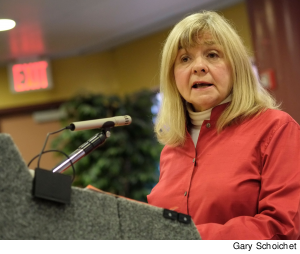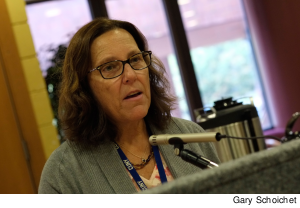CUNY adjuncts are familiar with being economically precarious, but things have taken a turn for the worse this semester at York College.
On September 20, 2012, the first senior college pay date, 125 of York’s 347 part-time faculty members failed to receive their first paychecks of the semester. When the second payday arrived on October 4, at least 40 adjuncts remained unpaid.
 |
“It’s sheer negligence,” said York PSC Chapter Chair, Janice Cline. “People have to get paid.”
“It’s outrageous on so many levels,” added an adjunct who went unpaid again on October 4, despite having taught at York for four years. “That it’s [affecting] the most vulnerable population is particularly outrageous.”
MAKING THE NEWS
York’s adjunct paycheck blunder landed in the pages of the Daily News, first on September 27, 2012 and then again on October 3, 2012. The second article featured PSC activists’ work on a petition drive that the union organized in response to the paycheck snafus. The petition calls on York President Marcia Keizs to publicly apologize to the college’s adjuncts and ensure that such an incident does not happen again. It quickly received more than 200 signatures from both faculty and students.
“A lot of students passing by also signed the petition and were clearly sympathetic about this mistreatment of adjunct faculty,” said Shirley Frank, an adjunct who has taught at York since 1999. “I mentioned to one student that some adjunct faculty haven’t seen a paycheck since May, and she rolled her eyes as if to say, ‘I know how that is!’”
To date, the York administration has been anything but apologetic. “Our employees have been paid on time,” insisted Dolores Swirin, York’s vice president of institutional advancement, according to the
October 3, 2012 report in the Daily News. This came as a surprise to adjuncts who were still unpaid on the second senior college pay date of October 4, 2012.
Swirin maintained that York had met its obligation to employees because it allowed those who had gone unpaid to fill out a special application for an emergency cash “advance” equal to 60% of the gross pay they are owed. But union activists say that many adjuncts did not know of this option, and that adjuncts with tight schedules may not be able to file this application, which must be done at the HR office in person, for several days. Many are owed net pay that is more than the 60% York is willing to provide.
The bottom line, said Cline, is that giving employees their paychecks on time is not optional. “Why should more than a third of our adjuncts have to request a special ‘advance,’ when it’s money they are already owed for work they have already done?” she asked. And the paycheck delays, Cline added, were entirely avoidable.
DEADLINES
August 8, 2012 was the deadline for department chairs to submit Personnel Action Forms (PAFs) for their fall semester adjuncts. Cline says she knows of no department that failed to submit the PAFs in time, including three departments in which significant numbers of adjuncts did not receive their paychecks though PAFs were timely submitted, anywhere from June, 2012 to early August, 2012.
The PAFs were supposed to be reviewed by the Budget Office, the Division of Academic Affairs and then the Human Resources Department. Based on an August 20, 2012 e-mail from Executive Director of Human Resources Barbara Manuel to nearly a dozen top officials at York, Cline suspects that there was holdup in the Division of Academic Affairs with processing the forms. In the e-mail, marked “Importance: High,” Manuel warned of additional complications: “We have lost both of the full-time employees responsible for processing adjunct appointments and the college assistant working on these appointments has also left our employ.” As a result, she indicated it would be difficult to get all PAFs processed by the August 31, 2012 deadline – and that adjuncts for who PAFs were processed after that date would experience a pay delay.
“York could have seen this as a five-alarm fire,” Cline said. “But they let this situation happen because adjuncts are not seen as a priority.”
After learning of Manuel’s concern that Human Resources might not be able to meet the August 31, 2012 deadline, Cline spoke with Manuel by phone on August 22, 2012, and urged that the college hire temporary workers or bring in workers from other departments to help speed up the backlog – but no such action was taken.
 |
The PSC’s grievance counselor at York, Lorraine Stern, is also a professor of accounting and finance at the college and a certified accountant. “If I was auditing our school and saw how poorly things were run, I would say there was a management failure at the highest level,” commented Stern.
‘FED UP’
Stern said that as a grievance counselor, she has seen similar failures at York on other issues. “It’s a management problem,” she told Clarion. “People are fed up here because things don’t run smoothly.” For example, Stern said, York College consistently fails to reimburse faculty on time for their travel expenses and the union has had to file grievances over this problem every year since 2009.
As Clarion went to press, Cline said the York chapter leadership planned to press college leaders for answers at a labor-management meeting slated for October 11, 2012.
DOUBLE STANDARD
Several York faculty told Clarion that the college administration’s sloppy handling of adjunct paychecks stands in stark contrast to its strict insistence that faculty post grades on time at of the end of the semester or else receive a reprimand that goes into their personnel file.
Contingent faculty at York are not the only part-timers who have been left without paychecks this semester. According to CLT Chapter Chair Albert Sherman, about 50 adjunct CLTs were not paid in the first pay period of the new semester. There have been problems identified at City Tech, Medgar Evers, Hunter and York, Sherman said, and some adjunct CLTs still had no checks when the second pay period arrived.
“Half of my e-mails are people saying, ‘Albert, what do I do?,’” said Sherman, who decried CUNY’s indifference to its part-time workers. “What if the vice presidents didn’t get paid? Would that be accepted? This affects people’s lives, and they don’t get it.”
“I would feel better if somebody would step up and say, ‘We’re sorry. We made a mistake,’” said an unpaid CLT at City Tech. “It feels like we’re getting the runaround.”
Problems with paying part-timers have been a recurrent problem at CUNY, one that management often ignores until there are loud protests from the union (see Clarion, March 2009). While some campuses can be worse than others, PSC leaders say that these repeated errors highlight the failings of CUNY’s two-tier labor system.
“The underlying issue is the need for adjunct job security,” said PSC First Vice President Steve London. “Treating every adjunct as a new employee, even when they have worked at CUNY for years, is not just unfair, it’s bad management. When someone is a veteran faculty member – who may well have worked at CUNY longer than their college president – it makes no sense to constantly take them off payroll only to put them back on again.” This practice invites unnecessary mistakes and adds up to a lot of wasted effort, he told Clarion.
Job security for CUNY adjuncts is first of all a matter of justice, London emphasized, but it’s also just the logical thing to do.
______________________________
RELATED COVERAGE:

